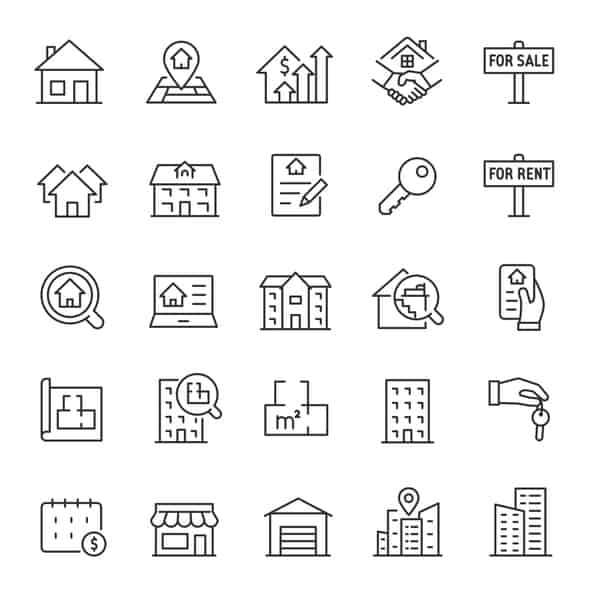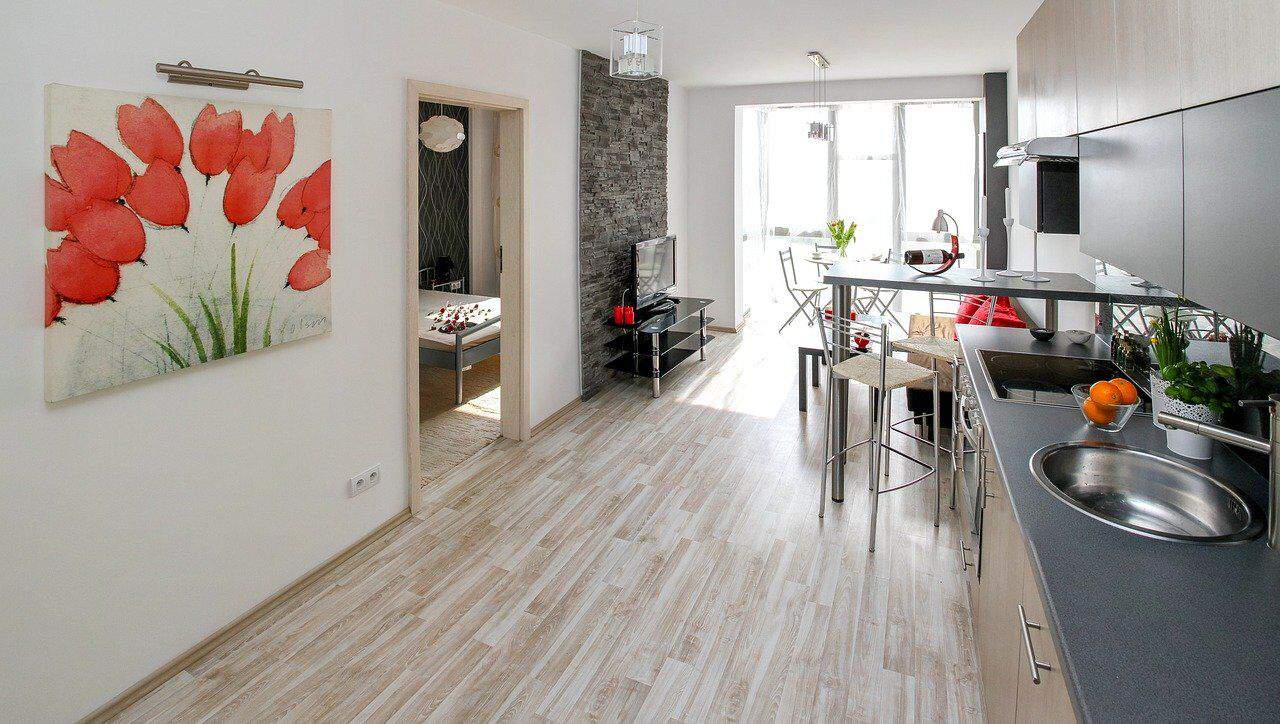Homeownership is more than just a good investment for many Americans. It is a way to live out their American dream, with the home being a symbol of achievement and stability.
There are many reasons why it is a good idea to purchase a home. You might be ready for the commitment or struggling with your landlord, and you want to take control of your living situation.
Although landlords might be difficult at times, it is important to protect your renting rights, which is why the federal government is always advocating for equal housing opportunity.
Homeownership is often not within reach for many people because of skyrocketing prices, high property taxes, and strict mortgage requirements.
So, which is better? Let us explore the pros and cons of each.
Owning a House vs. Renting an Apartment

The decision to rent vs. buying a home is both a personal and financial one (depending on your financial situation). Buying your own house is generally more expensive than renting, but it offers additional benefits that renters do not have the luxury of enjoying.
Should you rent an apartment or buy a house with that in mind? Your selection may be influenced by a variety of factors, including your existing financial health and the desire to relocate. So, in order to determine which option is best for you, you must first grasp the benefits and drawbacks of apartment renting versus buying a house.
In this post, we will examine the pros and cons of each option.
Pros of Owning a House
Owning a home can be a wonderful investment and one that many people aspire to make. Below are some of the reasons why this is:
Long-Term Investment
Buying a home is a good long-term investment. According to reports by the Federal Reserve Bank of St. Louis, between 2009 and 2019, the housing market value increased by $11.3 trillion. In the same period, the average price of homes sold increased by 28%.
The property value may decline in the short term, but this is generally offset by the value of the land on which your home is built.
That said, you may be able to make a decent return on your investment if you sell the house in the future. If you are wondering “how can I value my house online for free?”, head to webuyanyhouse.co.uk.
Long-Term Equity Building
Your home equity is the difference between what you can sell your property for (selling price) and what you owe (loan balance). Apartment or home renting does not provide you with any equity, as your monthly payments have no value over time. However, the more you make your payments for a mortgage, the more equity you build up.
So in this case, it is wise to pay a mortgage rather than committing to a monthly payment via rent if you want to have leverage in the future. With that said, you can borrow more loans against your property as collateral.
More Privacy Compared to Renting an Apartment
Many apartment complexes receive noise complaints regularly. Since a wall separates you and your next-door neighbor, you are vulnerable to noisy apartment neighbors/noise pollution. Besides, it is hardly possible to have a private space to hang out with your family. In this situation, owning a home is a major win because it gives you more freedom and privacy than a rental property typically does.
Advantages of Tax Deductions
Buying a home gives you some federal tax benefits (financial benefit). The IRS offers tax reductions for typical tax deductions, such as private mortgage insurance and mortgage interest, in order to make home ownership more affordable.
Backyard Space Can Help You Enjoy the Outdoor
In comparison to a tiny balcony in an apartment, a home has a larger backyard space. With a larger backyard, you can do more things, like go camping or build an above-ground pool.
In addition, you may also build a patio deck to relax with your family in your own home; your options really are unlimited. Most of the time, your next-door neighbor is a little further away, so you are less likely to be disturbed if you are trying to get some rest.
Ability to Decorate the Home to Your Taste
Owning a house gives you complete control over how you want the home to look. You can replace the interior and paint it a new color without anyone influencing your selection.
That said, it is easy to make changes compared to apartment renting. Often, rental properties require you to run the decision by the landlord before making any major changes. In fact, you will be unable to make significant changes to an apartment and will be compelled to leave it as-is.
Keep Your Pets without Worrying About Restrictions
In many apartments, pet limits and breed restrictions are common industry practices. With that said, you may find the perfect apartment, but a restricted breed might as well make you lose the chance to live in that apartment.
On the other hand, owning a home gives you the freedom to have the kind of dog breed you want. In addition, because you will be needed to attend a pet interview, the apartment clearance procedure can be time-consuming, and you may have to follow a strict apartment pet policy.
Cons of Owning a House
Owning a home does not come without its difficulties, one of which is high housing prices. Here are some of the cons of owning a home:
Higher Repairs and Maintenance Costs
Homeowners often face expensive tasks for repairing and maintaining their homes. Repairs can cost thousands of dollars, and many homeowners don’t have the money on hand for this type of unexpected expense.
From the heating and cooling system to the roof, many moving parts can require maintenance or repairs. These other costs often exceed what a homeowner anticipates. For this reason, an apartment renter is a big winner here because there are little to no maintenance responsibilities.
This is why potential buyers must do thorough financial planning before taking a step to acquire a home.
Requires a Long-Term Commitment
If your job necessitates frequent relocations, purchasing a home might be a very expensive alternative because you will have to sell it before making another move. In reality, compared to a few household things in an apartment, moving in and out of a home is quite pricey. This implies you will be spending more time relocating from one home to the next. With that said, apartment renting here would be a great option.
Mortgage Payments Typically Higher than Renting an Apartment
In most cases, a mortgage payment can be higher compared to rent expenses. If you don’t have a stable job, renting a flat makes more financial sense compared to buying a house as a primary residence.
Cost of Property taxes
Homeownership comes with a series of expenses, which includes property taxes. You are obligated to pay them as required by law. An apartment renter has no property tax responsibility, as it is paid by the property owner.
Higher Upfront Housing Costs Compared to Renting an Apartment
When compared to renting, the purchase price/asking price of a property is much higher (especially when adding the closing costs). For example, home buyers typically have to put down at least a 20% down payment to qualify for a mortgage. In addition, home buying necessitates paying homeowners insurance, which is a separate expense. However, renting an apartment only requires paying a security deposit, one month’s rent, pet deposit (if applicable), and an application fee.
Pros of Renting an Apartment
Apartment renting can alleviate a lot of liability, while still providing a safe and cozy environment for you and your family. Below are some of the reasons why this is:
Flexibility to Move to Different Locations
If you want to move out of an apartment, all you need is to give a 30-day written notice to your landlord, especially if you are on a month-to-month lease option. For a home, the case is totally different and takes longer. For this reason, as a renter, you enjoy the flexibility of changing locations without breaking the bank.
A home’s location is typically not convenient, like apartments. That said, it is easier to access public transport while living in apartments compared to home living.
No Responsibility for Repair and Maintenance
As a tenant, you have no obligation to maintain the property like a homeowner. Of course, your lease agreement stipulates your role in repair maintenance (learn more on how to read an apartment lease here). That said, most renters often spend less on utility and maintenance than homeowners.
The majority of the time, a renter has more discretion over how much they spend on utilities than a homeowner. In addition, a unit is often smaller and, thus, requires less heating and cooling compared to stick-built homes, or even mobile homes for sale.
No Real Estate Taxes
Renting an apartment allows you to avoid having to pay property taxes. Apart from rent and renter’s insurance, you don’t have much else to spend your money on.
Lower Upfront Cost
Moving to an apartment costs a lot less than buying a house (no down payment like buying a home). Also, logistics will cost less compared to moving into a home, and renters have a big relief since they don’t pay HOA fees, like homeowners do.
Utility Costs May Be Included in Rent Payment
Some apartment communities include utilities in their rental payments, so renters do not have to worry about them. Often, spending money on utilities is a big commitment and that is why your rental agreement will outline which utilities are covered. So, ensure you go through the rental agreement and understand which apartments that include utilities. For instance, in most cases, trash removal is one item included in the rent payment.
Cons of Renting an Apartment
There are some definite drawbacks of apartment renting. Here are some of the cons below:
You Will Not Build Equity with a Rent Payment
The rent you pay does not earn you any equity in the long term, so a homeowner is better off paying a mortgage, if building equity is a priority, in the long run.
Limitations When Upgrading the Space
There are strict rules in place that dictate what you can and cannot do with the apartment space. From painting the walls to installing new furniture, everything is monitored by the landlord or property manager. With that said, as a renter that signed a lease, you may be forced to stay in a unit that does not compliment your taste.
Rent May Increase Annually
When can your landlord increase rent? When renting an apartment, rent increases are unavoidable. A landlord may give you notice that you will be required to pay a higher rent when the lease ends, which might be a major setback if you are on a tight budget.
Amenities Can Be Old or Out-Dated
In most cases, when you want to save money, you may be forced to settle on a unit with out-of-date amenities. Old amenities are unappealing, and your apartment living experience will not be as nice as you would like.
No Privacy
Living in an apartment can be difficult because there is less privacy. There are often long hallways and open spaces to which everyone has access to. This can make it difficult to truly relax and feel safe in your own space.
No Credit Score Improvement
While paying your mortgage on time raises your creditworthiness, paying rent does not give you the same benefit.
Final Thought
Based on the pros and cons of both options, we can conclude that renting an apartment is the better option. It makes more sense to have flexibility, closeness to a city, and fewer upfront costs, such as renters insurance, to name a few advantages. The perks of apartment living can help you save more money and be financially stable in the long term.









